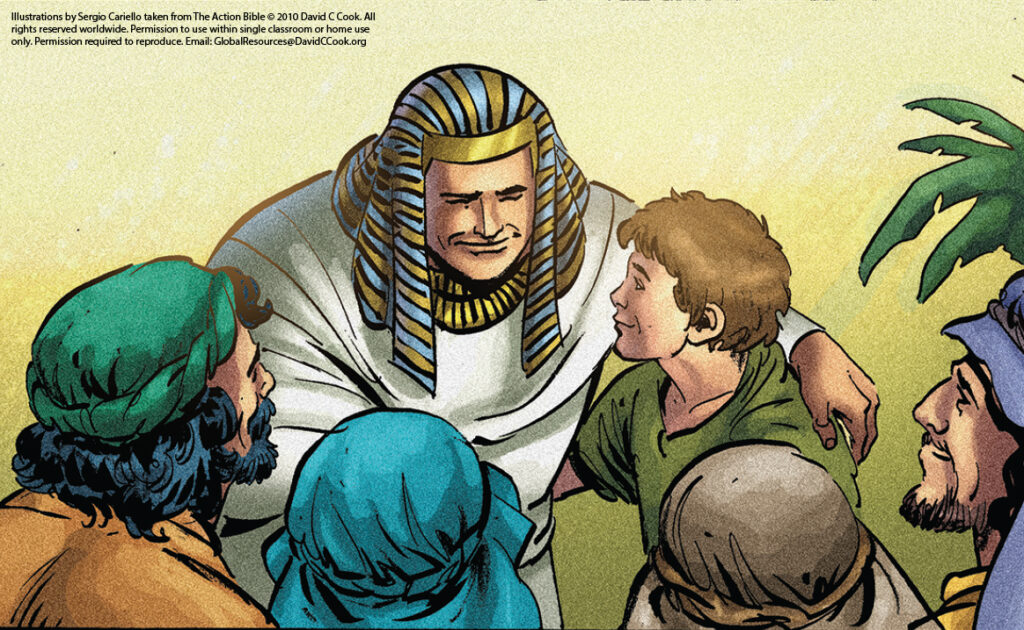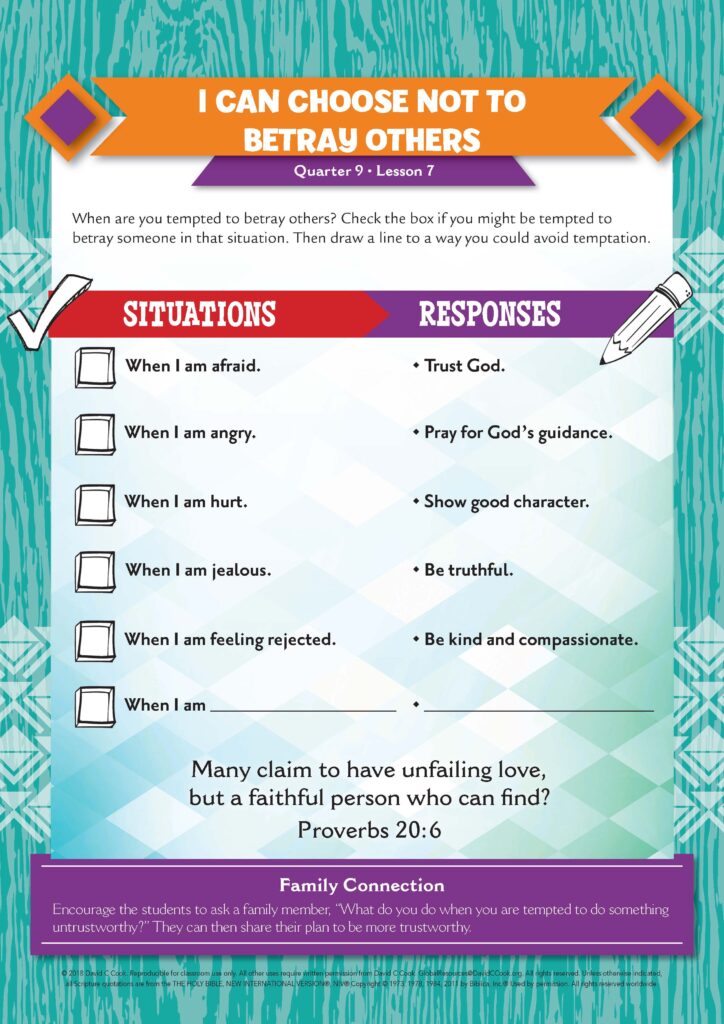During the lesson, the information for you to know is written in regular type, and what we suggest speaking or reading aloud to children is in bold. All resources for this lesson, including the Teacher Guide, Student Page, Family Connection Card, and other resources can be downloaded in a ZIP file by clicking on the following link:
In some lessons you will find "resource articles." These are articles written by experts from around the world to help equip you for your work with children and adolescents. Share them with parents or guardians if you consider it appropriate.
Before class, tear out the page at the end of the lesson that has different endings to Michael’s story. Separate the 3 sections.
“Love the Lord your God with all your heart and with all your soul and with all your mind and with all your strength.’ The second is this: ‘Love your neighbor as yourself.’ There is no commandment greater than these.”
Mark 12:30–31
Jesus taught us to love others as He did, but sometimes our choices are far from loving. Sometimes we put our needs before those of others. Sometimes we choose to cause someone else pain in exchange for our gain. Betrayal is always a choice, and we can choose to make the right one. God has called us to be trustworthy and to treat others with honour. He will give us the strength to do that, even when it is difficult.
Think of a time you were tempted to betray someone. Did you give in to the temptation? Or did you ask God for the strength to choose the right path? In your moments of weakness, you can cry out to God and draw on His strength. When you allow Him to rule your heart and mind, He will give you the strength to overcome the temptation to betray others.
Encourage the students to ask family members, “What do you do when you are tempted to do something untrustworthy?” The teens can then share their plans to be more trustworthy.
Teacher Tip: If possible, email or text the Family Connection Card to the families of your students.
As you greet the students, ask them if they were able to use what they learned about healing from betrayal. If any of them would like to share with the whole class, allow 1–2 students to share their stories.
Read this story aloud to the students. Explain that they will get into 3 groups that will act out 3 different endings for the story. Then they will decide which is the best.
Michael lives on the streets. Life is hard, but he is glad to have his best friend, Nico, to help him. Michael and Nico depend on each other. They talk about getting off the streets and sharing a small house someday. One day Michael and Nico go to different areas of town to beg and look for food. A generous stranger gives Michael a large amount of money.
Michael wants to honour his friendship with Nico and share the money with him, but he can think of so many things he can buy for himself with that money. I could keep the money for myself and Nico would probably never know, he thinks.
Divide students into 3 groups and give each group a slip of paper with a possible ending on it. Each group will create a short drama showing what happens with their ending to the story. Give the groups about 5 minutes to create their dramas. After that time, ask each group to share their drama with the rest of the class.
After the groups have acted out their endings, gather the whole class together and ask the following questions.
Which of these endings was the best solution?
How did each possible ending affect Michael and Nico?
In all of our relationships, we have a choice to make: Will we be trustworthy, or will we betray others? We need to understand the consequences of betrayal so we can choose to be trustworthy.
In the last lesson, we talked about Joseph, who was betrayed by his brothers and sold into slavery. Joseph became a slave in the house of an important Egyptian official named Potiphar. Potiphar’s wife falsely accused Joseph of raping her, so he was put into prison
While Joseph was in prison he met 2 servants who were in prison for angering Pharaoh, the ruler of Egypt. One night, these servants had unusual dreams. With wisdom from God, Joseph interpreted the servant’s dreams. One of the servants, Pharaoh’s cupbearer, was forgiven and began to serve Pharaoh again. After 2 years, Pharaoh had a dream that troubled him. No one was able to help him understand. At that point, the cupbearer remembered Joseph. So Pharaoh called Joseph from prison to tell him what his dream meant.
God helped Joseph to interpret Pharaoh’s dream. He told Pharaoh that Egypt would have 7 years of plenty followed by 7 years of famine. He advised Pharaoh to choose a wise and discerning man to oversee the collection of food in the time of plenty so there would be food to feed the people in the time of famine. Let’s continue the story from there.
Have a student read Genesis 41:39–44. If that is not possible, use the passage written here for you.
Then Pharaoh said to Joseph, “Since God has made all this known to you, there is no one so discerning and wise as you. You shall be in charge of my palace, and all my people are to submit to your orders. Only with respect to the throne will I be greater than you.” So Pharaoh said to Joseph, “I hereby put you in charge of the whole land of Egypt.” Then Pharaoh took his signet ring from his finger and put it on Joseph’s finger. He dressed him in robes of fine linen and put a gold chain around his neck.
Genesis 41:39–42
Why do you think Pharaoh trusted Joseph?
How do you think Joseph responded to Pharaoh’s offer?
Because of the betrayal of others, Joseph was put in prison. But he continued to trust God, persevere, forgive, and trust others. Joseph became an important official in Egypt, and he was given great authority. Pharaoh trusted Joseph with everything he had.
Do you think Joseph betrayed Pharaoh’s trust? Why or why not?
Joseph chose to be trustworthy. The betrayals of others had forced Joseph to face many obstacles and challenges. With the power Pharaoh had given him, Joseph could have done great harm to those who had betrayed him. But instead of choosing to betray others, Joseph chose to be trustworthy.
Joseph served Pharaoh faithfully during the 7 years of abundant harvests. He collected so much grain for the people of Egypt that it could not be measured. He married and had 2 children, and he thanked God for blessing him. When the famine started, Joseph opened the storehouses and sold grain to the people of Egypt. His wisdom and planning protected the Egyptians. Joseph continued to faithfully serve Pharaoh and the ruler after him.
As the famine spread, people from other countries began coming to Egypt to buy grain. Joseph received some surprising visitors. Listen to what happened next in Joseph’s story.
Optional: If possible, share the images from The Action Bible.

Now Joseph was the governor of the land, the person who sold grain to all its people. So when Joseph’s brothers arrived, they bowed down to him with their faces to the ground. As soon as Joseph saw his brothers, he recognized them, but he pretended to be a stranger and spoke harshly to them. “Where do you come from?” he asked. “From the land of Canaan,” they replied, “to buy food.” Although Joseph recognized his brothers, they did not recognize him.
Genesis 42:6–8
Joseph had many reasons to betray his brothers now that he was the person in power. Would you have betrayed them if you were Joseph? Why or why not?
Joseph tested his brothers twice. First, he tested their trustworthiness. He agreed to sell them grain, but he asked those filling the sacks to secretly place the brothers’ money in with the grain. Joseph’s brothers returned home with the grain and their money.
When Joseph’s brothers realized they had the grain and the money in their sacks, they were afraid. The next year when they went back to buy more grain, they told the truth and returned the money.
Optional: If possible, share the images from The Action Bible.

But Joseph tested them again. This time, he had the workers put a silver cup into the sack of his youngest brother, Benjamin. Then he sent soldiers after his brothers. They found the cup in Benjamin’s sack and accused him of stealing. On Joseph’s orders, the soldiers said that the rest of the brothers could go free, but Benjamin had to return to Egypt. However, all of the brothers chose to return to Egypt.
When Joseph pretended to be angry with his brothers, they apologized even though they had not put the cup in their bags. When Joseph threatened to keep Benjamin in jail, one of the older brothers offered to take his place. Joseph was so moved by the love they showed for their brother that he sent everyone else away. Listen to what happened when he was alone with his brothers:
Joseph said to his brothers, “I am Joseph! Is my father still living?” But his brothers were not able to answer him, because they were terrified at his presence. Then Joseph said to his brothers, “Come close to me.” When they had done so, he said, “I am your brother Joseph, the one you sold into Egypt! And now, do not be distressed and do not be angry with yourselves for selling me here, because it was to save lives that God sent me ahead of you.”
Genesis 45:3–5
Why do you think Joseph’s brothers were “terrified at his presence?”
They may have been worried that Joseph would betray them because they had betrayed him many years before.
Why do you think Joseph chose to protect his brothers instead of betraying them?
He had learned to forgive them.
If you are using the Memory Verse Poster, show it to the students.
Do not repay evil with evil or insult with insult. On the contrary, repay evil with blessing, because to this you were called so that you may inherit a blessing.
1 Peter 3:9

Joseph knew from the way his brothers responded to his tests that they had changed. Because Joseph chose not to betray his brothers, Joseph’s family was reunited.
Not every story of betrayal has a happy ending. Sometimes forgiveness and healing cannot make the situation better. But we always have a choice to betray others or remain trustworthy, even when others have betrayed us.
What can we learn from Joseph about being trustworthy and choosing not to betray others?
If the students do not mention them, be sure to include trust God, pray for God’s guidance, show good character, be truthful, and be kind and compassionate.
Becoming trustworthy is a journey, much like learning to heal from betrayal. It can take a long time for others to learn to trust you.
Listen as I read a situation that involves making a choice to betray or be trustworthy.
Situation: Your friend tells you about an opportunity she has to make money cleaning a neighbour’s house. You need the money for medicine for your sick sister. You think about telling the neighbour that you will clean for a little less money so he will hire you instead of your friend.
How could you choose to be trustworthy instead of betraying your friend?
Allow 2–3 teens to share their ideas. Some choices might be to pray that God would provide a job, to ask if the friend knows anyone else who needs housecleaning, or to talk about the situation with the friend to see if you can find a solution that will help both of you.
Think about times in your life when you betrayed someone or were tempted to betray someone. Why did you react that way? Were you afraid? Were you being selfish? Did you feel insecure or jealous? Were you angry? Even though we may be experiencing difficult emotions, we can always make a choice to be trustworthy. We can choose to trust God and do what is right instead of choosing to betray another person. Listen to what the Bible tells us about being trustworthy.
For we are taking pains to do what is right, not only in the eyes of the Lord but also in the eyes of man.
2 Corinthians 8:21
You have a choice. You do not have to betray others. Instead, you can trust God and be trustworthy. Think of an area of your life where you are tempted to be untrustworthy.
Pause for a minute to allow the teens to think.
Now turn to the person next to you. Work together to think of what you can do when you feel tempted to be untrustworthy. For example, maybe you can snap your fingers or slap your wrist to remind you to be trustworthy.
Give the students 4–5 minutes to discuss their ideas.
Optional: If you are using the Student Pages, have your students do the activity.

When you are tempted to betray someone else, you can always ask God for help. He can give you strength to do what is right in any situation. He can help you to be trustworthy.
How does it make you feel to know that you can call on God when you are tempted to betray others?
Invite the teens to share their thoughts with their partners. Give them 2–3 minutes to share and pray together, if they would like to. Then close with this blessing based on Psalm 25:21 and Proverbs 20:6
Blessing: May integrity and uprightness protect you as you wait on the Lord and trust in Him. May you be faithful and unfailing, someone others can trust.
Lead the children in singing this quarter’s song, if possible.
Life on Life ©2020 David C Cook. Reproducible for home or classroom use only. All other uses require written permission from David C Cook [email protected]. All rights reserved.